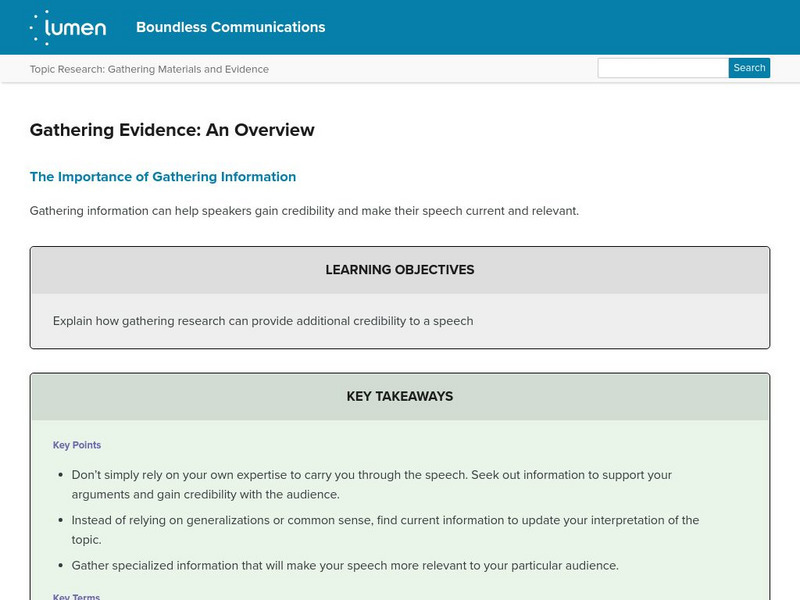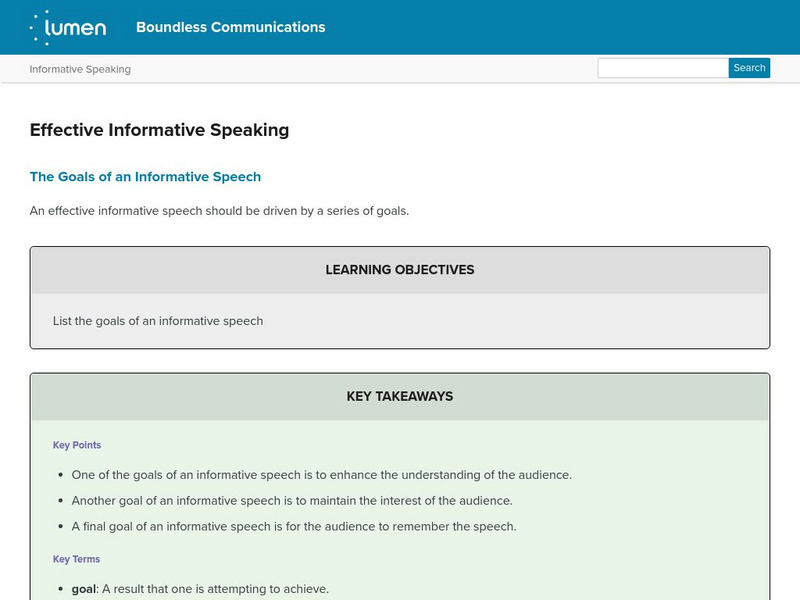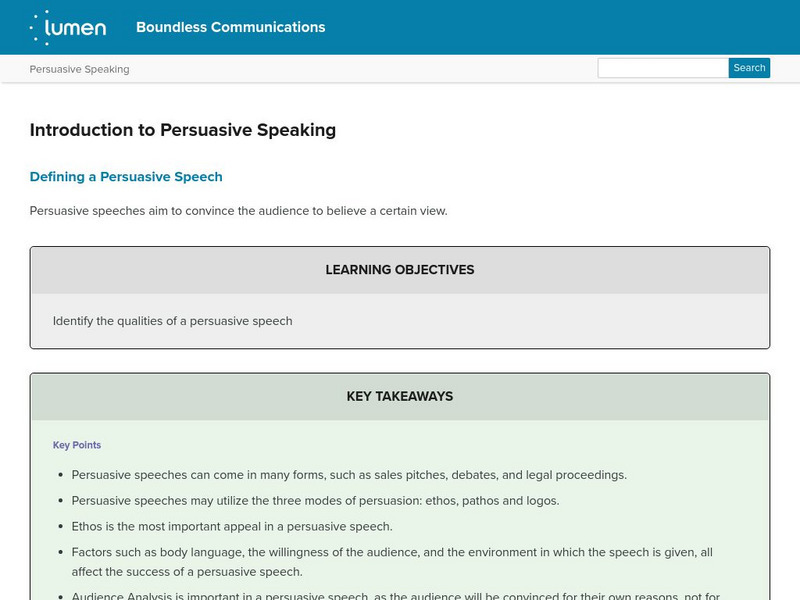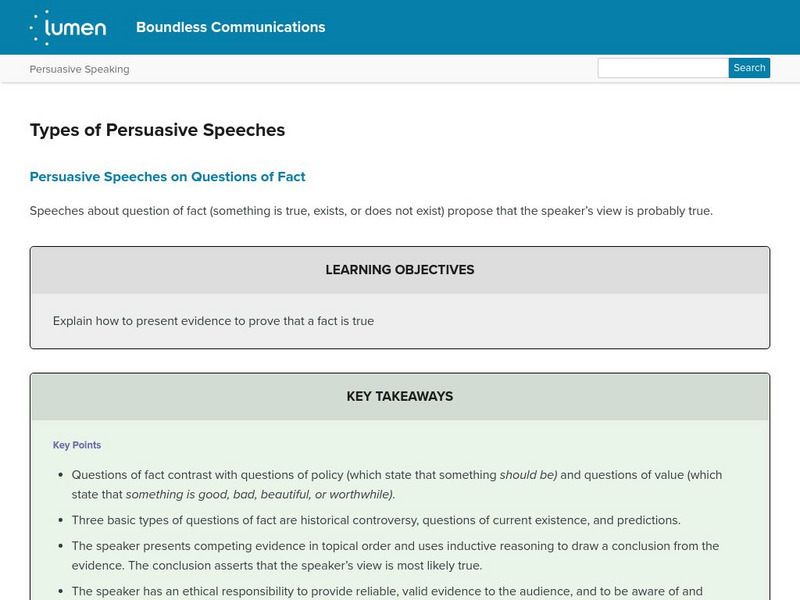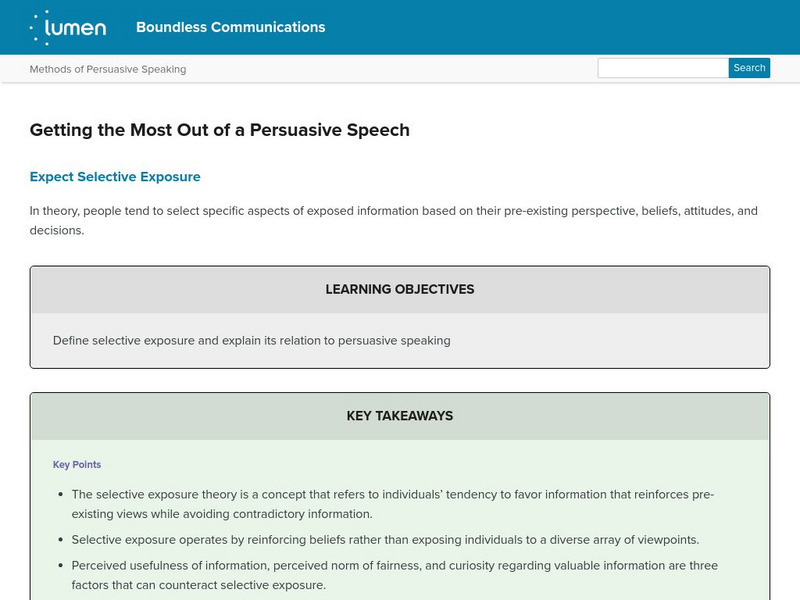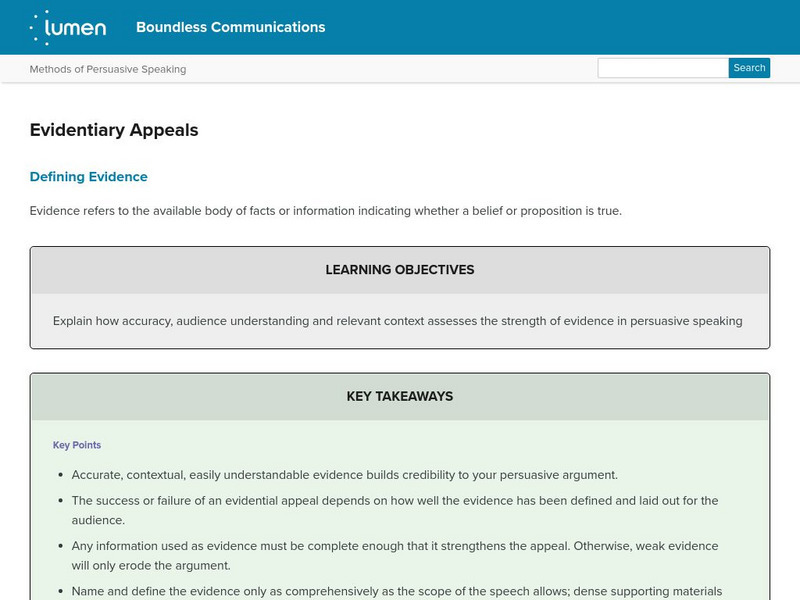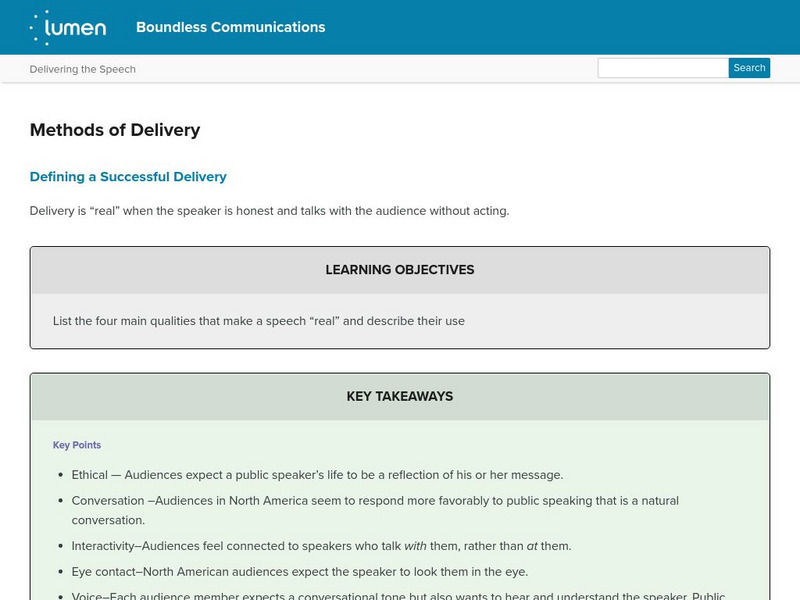Lumen Learning
Lumen: Boundless Communications: Gathering Evidence: An Overview
This instructional activity focuses on the importance of gathering information that provides evidence for your topic that is credible, current, and relevant. It also discusses how to find and evaluate sources. SL.9-10.1a Prepared/Discuss
Lumen Learning
Lumen: Boundless Communications: Effective Informative Speaking
This activity focuses on how to present an effective informative speech including keeping in mind the goals, scope, audience, and connections to the speech.
Lumen Learning
Lumen: Boundless Communications: Introduction to Persuasive Speaking
This lesson focuses on persuasive speaking including identifying the qualities, components, goals, and ethics of persuasive speaking.
Lumen Learning
Lumen: Boundless Communications: Types of Persuasive Speeches
This lesson focuses on three basic types of persuasive speeches: fact, value, and policy and information about each. It also provides questions you should ask yourself when analyzing a speech.
Lumen Learning
Lumen: Boundless Communications: Getting the Most Out of a Persuasive Speech
This lesson plan focuses on presenting a good persuasive speech. It discusses the selective exposure theory, kinds of appeals, and expectations.
Lumen Learning
Lumen: Boundless Communications: Evidentiary Appeals
This instructional activity focuses on the use of evidentiary appeals in persuasive speeches including definition, evaluating your evidence, and strategies for using evidence effectively. Click on next at the bottom right to continue.
Lumen Learning
Lumen: Boundless Communications: Logical Appeals
This lesson focuses on using logical appeals in persuasive speeches including inductive and deductive reasoning, inductive reasoning and associative reasoning, forming a rational appeal, and errors in reasoning-formal and informal.
Lumen Learning
Lumen: Boundless Communications: Using Examples
This lesson focuses on using examples to increase audience understanding of your speech including three types of examples: brief, extended, and hypothetical and how to use examples to help your audience understand the message.
Lumen Learning
Lumen: Boundless Communications: Using Testimony
This lesson focuses on the use of testimony in a speech including the difference between peer and expert testimony, questions to consider before using testimony, how to incorporate expert testimony, and an example of incorporating expert...
Lumen Learning
Lumen: Boundless Communications: Principles of Organization
This lesson focuses on the importance of organizing your speech including critically thinking about the contents of the speech, the components of the speech, the patterns of organization to fit the different types of speeches, and...
Lumen Learning
Lumen: Boundless Communications: Main Points
This lesson focuses on choosing the main points of your speech based on your audience and purpose. It also discusses ordering and highlighting your main points using visual and textual cues and using a variety of examples.
Lumen Learning
Lumen: Boundless Communications: Introduction
This lesson focuses on the introduction to your speech. It includes the role of the introduction, strategies for the opening, getting attention and interest, establishing credibility, self-presentation, and introducing the topic, thesis,...
Lumen Learning
Lumen: Boundless Communications: Conclusion
This lesson focuses on writing the conclusion of your speech including the role of the conclusion, summarizing ideas, signaling the end, and managing Q&A.
Lumen Learning
Lumen: Boundless Communications: Outlining
This lesson focuses on outlining your speech including the reasons for outlining, the kinds of outlines including their purpose what goes into each.
Lumen Learning
Lumen: Boundless Communications: Understanding Language
This lesson focuses on understanding the language, both verbal and non-verbal, of your speech. It discusses the importance of language, word choice, purpose and audience, ways of thinking about language, venue and occasion, and delivery.
Lumen Learning
Lumen: Boundless Communications: Using Language Effectively
This lesson focuses on using language effectively in your speech including using clear words and phrases, defining key terms, writing descriptively, using vivid language, considering your style and tone, and determining and addressing...
Lumen Learning
Lumen: Boundless Communications: Methods of Delivery
This is a comprehensive lesson on four speech delivery methods and the advantages and disadvantages of each; it also discusses how to make your speech "real."
Lumen Learning
Lumen: Boundless Communications: Speaking in the Real World
This lesson focuses on providing practical tips for speaking in a non-academic setting such as a wedding, charity event, or interview.
Lumen Learning
Lumen: Boundless Communications: Effective Vocal Delivery
This lesson focuses on the vocal delivery of a speech including volume, rate, pitch, pauses, and articulation and pronunciation.
Lumen Learning
Lumen: Boundless Communications: Effective Visual Delivery
This lesson focuses on effective visual delivery including appropriate dress and open posture, eye contact and facial expressions, body movements and gestures, and effective visual aids.
Lumen Learning
Lumen: Boundless Communications: Rehearsing the Speech
This instructional activity focuses on the importance of rehearsing a speech and the methods of rehearsing a speech including rehearsal through analysis and synthesis, simulated experience, mimic timing and context, practice with all the...
Lumen Learning
Lumen: Boundless Communications: Introduction to Informative Speaking
This lesson is an introduction to informational speeches including a definition, types of informative speeches, and topics.
Lumen Learning
Lumen: Writing Process: Prewriting
This lesson focuses on prewriting including the purpose and characteristics of prewriting, prewriting strategies, the rhetorical context, and developing a working thesis statement. It also includes a slide show about author, audience,...
Lumen Learning
Lumen: Rhetorical Appeals: Kairos and Logos
This lesson focuses on the 4th logical appeal called Kairos, a time when conditions are right for the accomplishment of a crucial action; the opportune and decisive moment.
